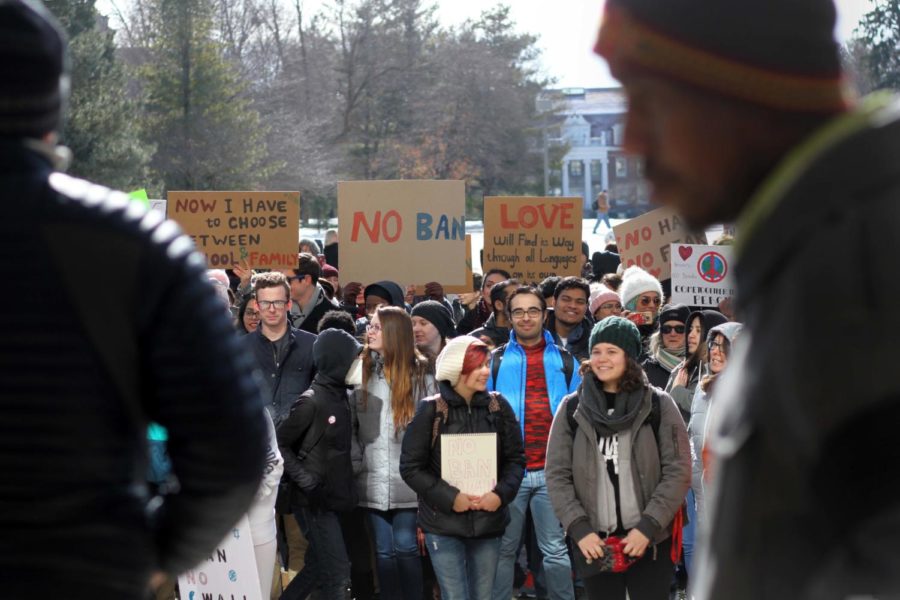Stanley: Muslim ban has no place in America
Hannah Olson / Iowa State Daily
Students marching with Hoodies and Hijabs join in solidarity with a group of Academics United protesters in front of Parks Library on Feb. 9.
February 13, 2018
President Trump, over the course of his campaign and administration, has repeatedly called for a ban on immigrants entering the country. During his campaign, he referred to it as a “Muslim ban,” and language calling for a “total and complete shutdown” of Muslims entering the United States was present on his website as late as May 2017, when it was suddenly scrubbed from his campaign website. Since then, the administration has tried to distance itself from an explicit religious slant, but that doesn’t change the fact that serious problems, both legal and ideological, still exist with the prospect of a ban on immigration.
However, it’s also important to keep in mind that with a Republican-controlled Congress, and a slim conservative majority in the Supreme Court, legal problems can evaporate very quickly, and the landscape of immigration legislation could change greatly over the next three years.
First, let us address the legal issues present with a stay on immigration. First and foremost, 8 U.S. Code § 1152 is a 1965 federal statute that outlaws discriminating against issuing a visa based on the recipient’s “race, sex, nationality, place of birth, or place of residence,” which President Trump’s “Muslim ban” most certainly does. Courts have not shied away from enforcing this statute either. In Vo Van Chau v. U.S. Dept. of State (1995), the DC District Court forced the State Department to process Vo’s wife’s asylum application after he successfully argued that she would be irreparably harmed if they did not. The same argument can certainly be made on behalf of Muslim asylum-seekers.
Unfortunately, there is one major problem with relying on this law: it can be repealed by Congress, just like any other law. With Congress currently controlled by Republicans, repealing 8 U.S. Code § 1152 is a definite possibility. President Trump would most definitely sign any bill that nullified it. The Supreme Court may grant an injunction against such a bill, maybe taking a stand on the blatant dismantling of a law that has served well for more than 50 years now, but the only parts they could rule unconstitutional are those which prevent permanent residents and citizens from returning. That scope is far too limited.
Ideologically, what do we gain from a Muslim ban? Ironically, the best arguments against such a prohibition are laid out in an official dissent cable from the State Department itself.
The ban fosters suspicion and unease in the Muslim world, including our own Muslim community.
It openly flouts international law, while shutting the doors on heroes and activists who could make an incredible impact on our society.
It calls us back to the darkest times in our history, where we again let hatred blind us and deprived tens of thousands of American citizens of their freedom for nothing more than their ancestry.
Most importantly, it flies in the face of the foundation of our nation. Wall Street and the system of stocks that Trump has so gleefully exploited was created by none other than Alexander Hamilton, America’s greatest immigrant. Immigrants have been behind some of the most game-changing innovations the world has ever seen, from brands like Levi Strauss and Liz Claiborne, to titans like Rupert Murdoch and Google. You get the picture.
The mutually beneficial ideal that immigrants are welcome is essential to our society. We also firmly hold the ideal concept of equality under the law; there are two Constitutional amendments enshrining it in the supreme law of the land. Combine these, and the inevitable conclusion is that we have a special obligation to maintain a system that is as just as fair, and as free as possible, from discrimination as much as we possibly can.
















